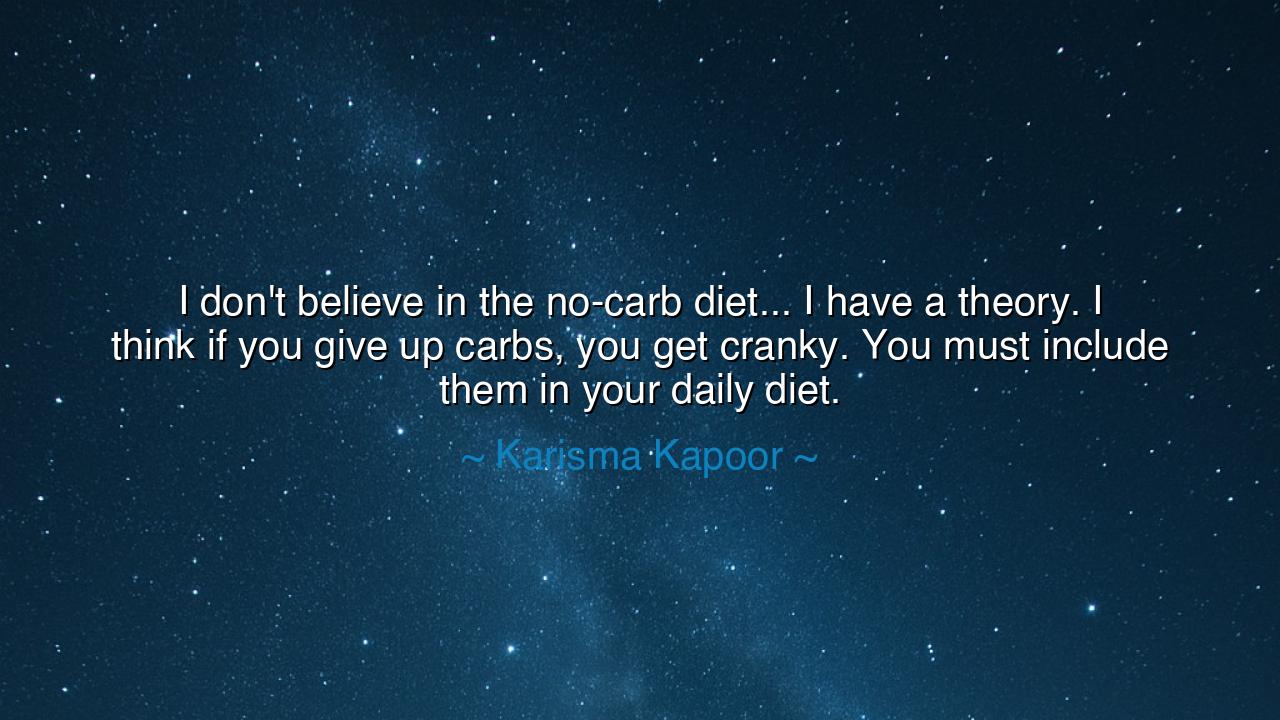
I don't believe in the no-carb diet... I have a theory. I think
I don't believe in the no-carb diet... I have a theory. I think if you give up carbs, you get cranky. You must include them in your daily diet.






In the journey toward health and vitality, there is an ancient truth that transcends the fleeting trends of modern diets: balance is key. Karisma Kapoor’s words—"I don't believe in the no-carb diet... I have a theory. I think if you give up carbs, you get cranky. You must include them in your daily diet"—offer us a profound reminder: the body thrives not on extreme restriction, but on thoughtful and balanced nourishment. In this simple yet powerful reflection, Kapoor speaks to the very core of our humanity: the need for sustenance, the importance of food, and the understanding that when we deny the body what it requires, we risk not only physical imbalance but also mental and emotional disturbance.
The ancients knew well that the body is not a machine to be controlled through deprivation, but a living organism that must be nourished with respect to its needs. Hippocrates, the father of medicine, spoke of the importance of a balanced diet, for he believed that true health lies in the harmony between food and body. To him, the consumption of carbohydrates, fats, and proteins was not simply a matter of sustenance, but a way to maintain the body’s natural balance. The practice of restriction—be it of carbs or any other essential nutrient—was seen as a denial of the body’s inherent wisdom. Kapoor’s assertion that eliminating carbs leads to being "cranky" mirrors this ancient wisdom: the body is not designed to be denied, but to be nurtured through mindful nourishment.
Think of the great warriors of the Spartan era, known not only for their strength but for their discipline in all aspects of life. Their training was rigorous, but so too was their diet, designed to keep them at their peak without excess. They knew that to be truly strong, one must nourish the body properly, taking care not to deprive it of essential fuel. The Spartans understood that too much of anything—whether indulgence or restriction—would create an imbalance, leading to weakness. The wisdom of the Spartans is echoed in Kapoor’s perspective: carbs are a necessary part of a balanced diet, and their absence disrupts the body’s natural harmony, leaving us lacking not just in energy, but in emotional clarity as well.
In the Roman Empire, Cicero was another great advocate for moderation. He often spoke of the importance of balance in life, whether in wealth, thought, or diet. The Romans understood that a diet of extremes would leave the body weak and the mind unsettled. They practiced moderation in all things, knowing that the key to longevity and strength lay in the middle way—neither indulgence nor deprivation. Kapoor’s words resonate with this ancient wisdom. To deprive the body of carbs, as many modern diets advocate, is to follow the path of imbalance, which leads not to strength, but to frustration and crankiness.
Consider, too, the teachings of Aristotle, who believed that happiness and well-being were found through the middle path, the golden mean between excess and deficiency. For Aristotle, virtuous living required cultivating a life of moderation, where the body and mind were treated with respect. His philosophy extended beyond moral virtue to physical health, where he emphasized the importance of balance in diet and exercise. Kapoor’s approach to diet—where she stresses the importance of carbs—aligns perfectly with this ancient view. The key to health, as Aristotle would argue, is not in restricting what we eat, but in eating what nourishes and sustains us in balance.
The ancient yogic traditions of India also offer insight into this principle of balance. In Ayurveda, the ancient system of medicine, there is an emphasis on the harmony of the body, mind, and spirit. The yogis understood that food is not just fuel but a means to nurture the body’s natural energies. Ayurveda teaches that carbs, like other nutrients, must be consumed in balance—too much or too little can lead to imbalance in the body and mind. The idea that restricting carbs can cause emotional unrest aligns with Ayurvedic wisdom, where the food we eat directly impacts our emotional and mental states. Kapoor’s belief in the inclusion of carbs in a healthy diet reflects this ancient knowledge: a balanced diet is one that nourishes not only the body, but also the mind.
Thus, Kapoor offers us a vital lesson—balance in all things is key. Carbohydrates, like all foods, serve a purpose in the body’s functioning, and their moderate inclusion is essential for maintaining physical and mental well-being. The ancients, from Hippocrates to Cicero, Aristotle to the yogis, understood that health is not achieved through restriction or extremes, but through mindful choices that honor the body’s needs. To deny carbs in the pursuit of health is to neglect the body’s wisdom, leading to emotional and physical imbalance.
The lesson here is profound and timeless: diet is not about denial or indulgence, but about harmony. Like Kapoor, we must embrace a diet that includes all the necessary nutrients in the right balance, honoring our bodies and minds with nourishment. Rejecting extremes and embracing moderation will not only foster health, but will guide us to a life of vitality, clarity, and joy. In our own lives, let us follow this wisdom, making choices that nourish us, that sustain our bodies, and that keep our minds clear and our hearts full. In the balance of diet, we find the foundation for a life well-lived.






AAdministratorAdministrator
Welcome, honored guests. Please leave a comment, we will respond soon